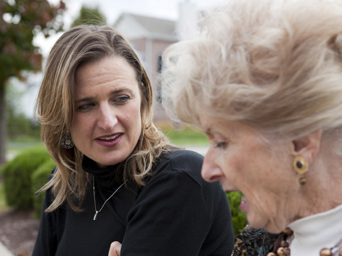The Gray Area: Is it safe to leave my loved one home alone?
 “Never put me in one of those nursing homes.”
“Never put me in one of those nursing homes.”
These words haunt caregivers – adult children, spouses, partners, close friends – across the country. But when your parent struggles to find their way to the kitchen, you may be facing the question, “When is it not okay to leave my loved one at home alone anymore?” This is a difficult question to answer, from a healthcare professional’s perspective and from a caregiver’s perspective. Sometimes it’s black and white, sometimes you’re stuck in a gray area. But you’re not alone. As the U.S. aging population grows, and is expected to double by 2030, so does the role of caregivers. More and more people are faced with the heavy duties of addressing the needs of a loved one, or making the incredibly hard decision to ask for additional support through elder care services like assisted living, or nursing homes.
Joanna Schade, Assistant Clinical Director at Crossroads Hospice in Plymouth Meeting, PA addresses this decision. “ Where do you feel most comfortable? Your home,” she says.
“It’s just not feasible sometimes. Think about an elderly person who’s a widow or widower, or (adult) kids who live out of state.”
Joanna, who has been a registered nurse for 26 years working mostly in long-term care, has worked with many families, and caregivers, trying to find the balance between taking care of a loved one and getting the support and services they need to live in a safe environment.
“The two biggies are safety and care needs,” Joanna explains. “[The caregiver has to ask themselves] ‘Can they provide for their own needs?’ If they can’t, the caregiver needs to look and say, ‘What can I do to make this a safer situation for my [loved one]?’”
Caregivers can be confronted with signs of decline in a loved one on a daily basis. Here are some scenarios that may occur with an aging loved one, and advice from Joanna to help a caregiver determine if it’s a sign that the loved one cannot be left alone in the future:
- Your loved one woke up in the middle of the night to go to the bathroom, and couldn’t find his/her way back to bed.
In this scenario, this would be a sign for a caregiver to monitor the loved one’s actions and start considering additional help or supervision for the loved one, “because they could fall,” says Joanna. “Safety is the biggest issue. If a patient can’t find their way back to bed, and they live in a house with two floors, are they going to wander and fall down the steps?”
- Your loved one fell asleep with a cigarette lit.
“I would not leave [the loved one] alone after that. It’s definitely a fire hazard,” Joanna says. “As [the loved one] gets weaker, they’re going to want to continue to smoke, and it’ll be more of a hazard,” she explains.
- Your loved one can sometimes remember the names of family and friends, sometimes not.
This isn’t a sign that a loved one can’t be left alone. “This is another situation where I’d watch that,” says Joanna. “It could just be they’re declining. It happens to everyone.”
- While you were at work, your loved one didn’t eat anything all day, and didn’t have an appetite when you offered food.
Although concerning, this isn’t a scenario where a loved one would need constant supervision or assistance. “[I would] definitely just watch that. Sometimes when you have a patient that’s declining, the appetite isn’t where it should be,” Joanna advises. “They may not be hungry, which is kind of normal for a lot of hospice patients.”
- During the day, your loved one thought he/she smelled smoke, and there was a fire a few doors down, but he/she didn’t investigate or call anyone for help.
The biggest concern here is if your loved one understood – and acknowledged -- the danger. “If it’s not in your home and they were able to go to the window and say ‘It’s the neighbor a few doors down,’” then your loved one likely can determine when their safety is compromised. But, it’s important to “watch closely,” Joanna says, to be able to determine if there’s a point where your loved one doesn’t understand when there’s danger in the home.
In addition to the safety scenarios listed above, there are a variety of questions you can ask yourself, too. Consider if your loved one can:
- Identify an emergency and call 911 if needed.
- Exit the house or apartment and find a safe place to go with help.
- Use the bathroom independently.
Ultimately, it’s up to the caregiver, family and healthcare professionals to work together to address the question head-on. “I’ve always believed that honesty is the best policy,” says Joanna. “I never sugar coat anything. If you have the best information, then you can make the best decisions.”
To learn more caregiver tips, please reach out to the Crossroads Hospice in your area, by completing our Contact Us form or calling us at 888-564-3405.
If you found this information helpful, please share it with your network and community.
Copyright © 2015 Crossroads Hospice. All rights reserved.




